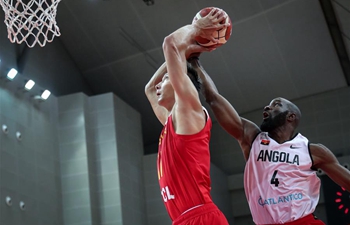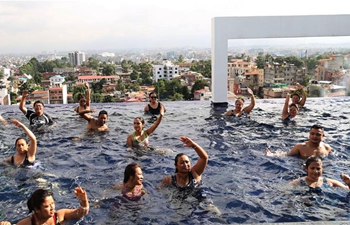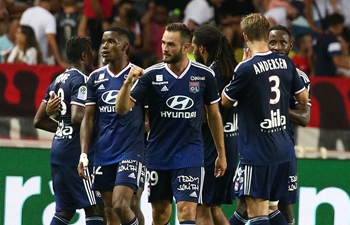ISTANBUL, Aug. 10 (Xinhua) -- The safe-zone agreement Turkey and the U.S. concluded amid Ankara's threat of a cross-border military operation against the Washington-backed Kurdish militia is far from blocking the emergence of a Kurdish state in northeastern Syria, analysts said.
Turkish and U.S. military delegations agreed on Wednesday to establish a joint operations center in Turkey to coordinate and manage a planned safe zone in the Kurdish-held territory in Syria.
"This deal is not a step that would settle Turkey's security concerns," Ali Er, a former army general, told Xinhua.
The establishment of a Kurdish state under the control of the People's Protection Units (YPG), the Kurdish militia which Ankara sees as terrorists, is being realized step by step, said Er.
It is not clear so far how the deal will block the emergence of a YPG-dominated state-like entity in northeastern Syria, a major security concern for Ankara.
Thanks to the U.S. military support during the Syrian war, the YPG has established two self-declared autonomous cantons on the eastern part of the Euphrates River along the Turkish border.
The Turkish government expressed satisfaction with the deal. Defense Minister Hulusi Akar, without elaborating, said the U.S. side's views about the safe zone moved closer to Turkey's during the talks.
There is nothing in the deal that would stop Washington from continuing its activities to set up a YPG-controlled Kurdistan in the area, said Cahit Armagan Dilek, director of the Ankara-based 21st Century Turkey Institute.
Both analysts agreed that a possible Turkish military operation on the YPG has been deferred at least for the medium term by the deal.
However, President Recep Tayyip Erdogan on Saturday said in a message released on the occasion of Eid al-Adha, or Festival of Sacrifice, that Turkey would add this month another victory to its "chain of victories Turks had in the month of August in history," suggesting a military operation.
Ankara sees a YPG-controlled area along its border as an existential threat, fearing the emergence of an autonomous Kurdish zone in Syria may set a precedent for its own nearly 20 million Kurds.
The analysts are concerned that Washington may use the deal as a stalling tactic, as the case with the YPG-held Manbij in northern Syria, while going on with arming the YPG.
Turkish Foreign Minister Mevlut Cavusoglu warned that no U.S. attempt to delay the process would be tolerated, implying that Ankara would then respond with a military operation.
Turkey has much criticized Washington, which, it fears, may be seeking to carve out a Kurdish state in Syria, for its huge supply of heavy weapons to the YPG.
Ankara says the Kurdish militia must hand over its heavy weapons to Washington.
The scanty details provided by the parties about the deal do not reveal how Turkey's security concerns have been met.
This agreement does not establish a safe zone but rather a de-escalation zone of 5-6 km deep where the YPG will simply be rendered invisible, Dilek maintained.
Ankara has so far demanded that the safe zone go as deep as 32 km into Kurdish-held territory from its border, while Washington says the zone should be 5 to 14 km in depth.
Reportedly, Washington had earlier proposed a two-tiered safe zone. The YPG would have no presence in the first 5 km of the zone from the Turkish border and would withdraw its heavy weapons from an additional 10-km-deep strip of land.
Turkey appears to have given up the idea of a military operation and be content with joint patrols Turkish and U.S. troops are expected to carry out in the planned safe zone, Er stated.
The U.S. may continue arming the YPG outside of the safe zone, he underlined.
According to the deal, Turkey's security concerns will be addressed by "the rapid implementation of initial measures."
A joint operations center will be set up in Turkey to coordinate and manage the establishment of a safe zone which Turkey describes as a peace corridor.
Dilek cautioned, however, that a joint operations center will serve as a critical tool for the U.S. to hold Turkey's potential moves into Syria in check as well as delay and block them.
Under the safe-zone deal, efforts will also be made for displaced Syrians in Turkey to return to their homes in the YPG-held territory.
Turkey officially hosts over 3.6 million Syrians, with at least several hundreds of thousands of them estimated to have come from the YPG-held territory.
Turkey's only tangible gain in the deal is the potential transfer of hundreds of thousands of displaced Syrians, Arabs, Turkmens and Kurds to the safe zone, said the analysts.
Turkey will be given a share of housing rebuilding in the safe zone after de-escalation has been achieved, said Dilek.
"But this could also lead Ankara into having dialogue with the YPG, which is Washington's final aim," he added.
Turkey wants the safe zone, where the YPG militia will be made to leave, to be under its control, a demand to which the U.S. had not reportedly agreed in previous negotiations.
Instead, observation posts may reportedly be put up at several places along the safe zone where Turkish soldiers would serve with troops from the U.S.-led coalition forces in Syria and conduct joint patrols in the area.
Ankara has long tried to convince Washington to jointly set up a safe zone, threatening at the same time that it would not tolerate the YPG presence along its border.
Ankara says the YPG is the Syrian offshoot of the outlawed Kurdistan Workers' Party, which has been fighting for an autonomous, if not independent, Kurdistan in Turkey's predominantly Kurdish southeast.

















